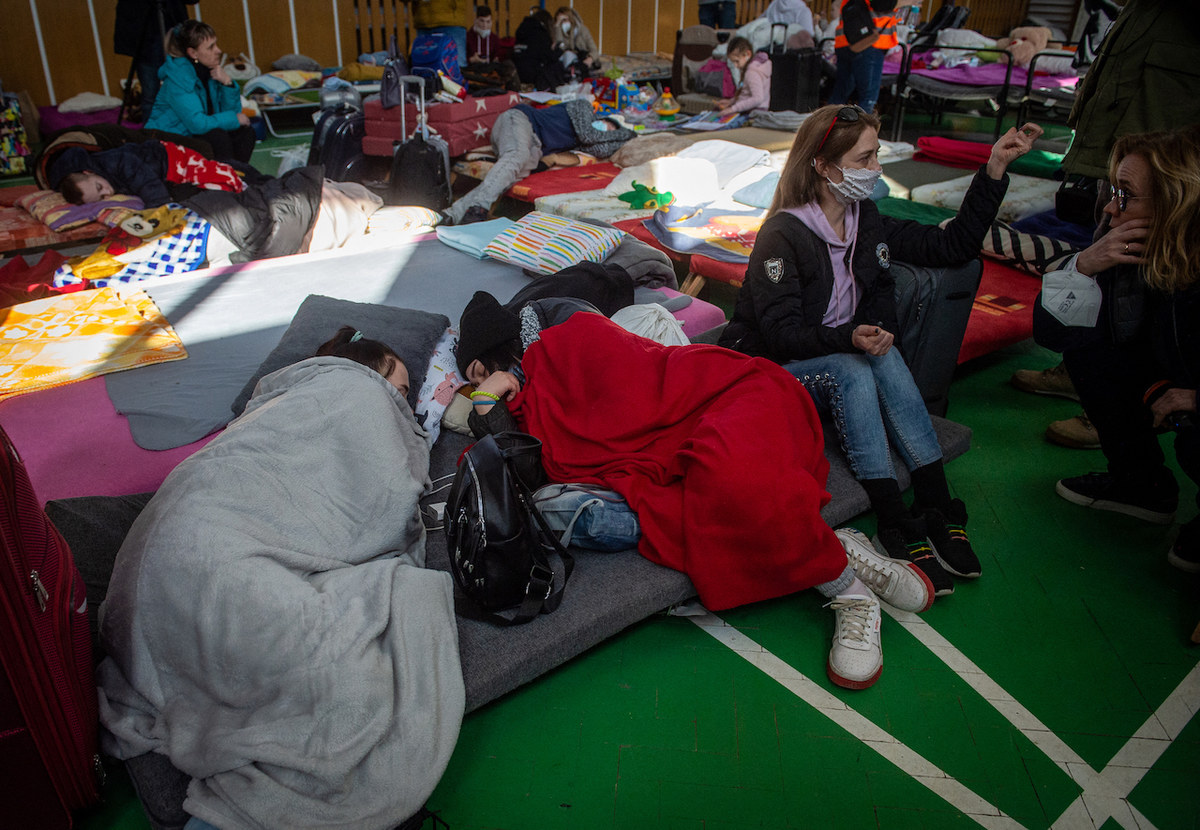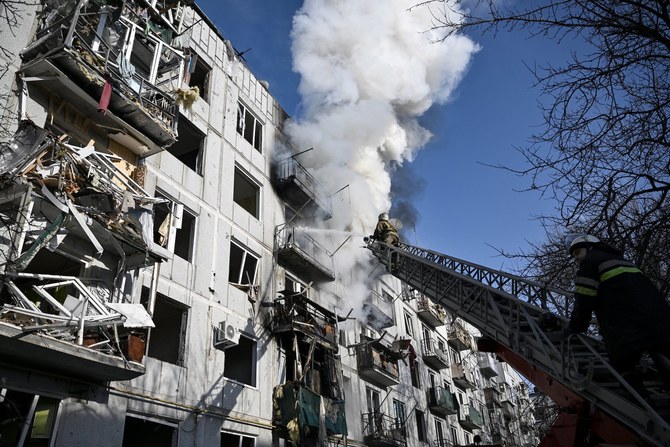RIYADH: The EU decided to ban its aerospace to Russian flights and aircrafts in a fresh round of actions in response to Russia's invasion of the Ukraine.
Highlights:
- The German government had asked utility firm Uniper UN01.DE to resume its plans to build a liquefied natural gas, or LNG, terminal in Wilhelmshaven, Handelsblatt newspaper reported on Sunday, as Germany steps up its plans to cut dependence on Russian gas.
- UK considers using strategic oil reserves to stabilize prices, Bloomberg reported
- British energy giant BP said on Sunday it had decided to exit its 19.75 percent stake in Russian state-controlled oil firm Rosneft after Russia's invasion of Ukraine.
- BP Chief Executive Bernard Looney, who will step down from the Rosneft board, said in a statement that the invasion "caused us to fundamentally rethink BP's position with Rosneft."
- Britain's business secretary Kwasi Kwarteng said on Sunday he welcomed BP's decision. "Russia's unprovoked invasion of Ukraine must be a wake up call for British businesses with commercial interests in [Russian President Vladimir] Putin's Russia," he said on Twitter.
- US banks are preparing for retaliatory cyberattacks after Western nations slapped a raft of stringent sanctions on Russia for invading Ukraine, cyber experts and executives said.
First, we are shutting down the EU airspace for Russian-owned, Russian registered or Russian-controlled aircraft.
They won’t be able to land in, take off or overfly the territory of the EU.
Including the private jets of oligarchs. pic.twitter.com/o551M9zekQ
— Ursula von der Leyen (@vonderleyen) February 27, 2022
From Earlier Today:
Fire in Ukraine oil and gas facilities
Huge explosions from Russian attacks on oil and gas installations lit up the night sky in Ukraine early on Sunday, while Western allies tightened sanctions to banish major Russian banks from the main global payments system.
Ukrainian forces were holding off Russian troops advancing on the capital Kyiv, President Volodymyr Zelensky said as the biggest assault on a European state since World War Two entered a fourth day.
But the night was brutal, with shelling of civilian infrastructure and targets including ambulances, Zelensky said.
#RussiaInvadedUkraine #StopPutin pic.twitter.com/Fbi81teeHi
— Ukraine / Україна (@Ukraine) February 26, 2022
Germany switch to LNG
Germany will make good on plans to build two liquefied natural gas (LNG) terminals and up its natural gas reserves to cut its dependence on Russian gas after Russia's invasion of Ukraine, Chancellor Olaf Scholz said on Sunday.
"We will do more to ensure secure energy supply for our country," he told lawmakers in a special Bundestag session called to address the Ukraine crisis.
"We must change course to overcome our dependence on imports from individual energy suppliers."
Opinion
This section contains relevant reference points, placed in (Opinion field)
Germany has been under pressure from other Western nations to become less dependent on Russian gas, but its plans to phase out coal-fired power plants by 2030 and to shut its nuclear power plants have left it with few options.
Earlier this week Germany halted the $11 billion Nord Stream 2 Baltic Sea gas pipeline project, Europe's most divisive energy project, in response to Russia's actions toward Ukraine.
In coordination with I will now propose new measures to EU leaders to strengthen our response to Russia’s invasion of Ukraine and cripple Putin’s ability to finance his war machine. https://t.co/iU2waDzo9s
— Ursula von der Leyen (@vonderleyen) February 26, 2022
Russian flights ban
A European Union-wide ban for Russian flights is now part of a fresh package of sanctions on Moscow discussed on Sunday by the bloc's foreign ministers.
A vast majority of EU member states have already closed their airspace to these flights.
Denmark will be closing its airspace for Russian aircraft
At today’s meeting of EU ministers of foreign affairs we will push for an EU-wide ban#Russia’s unprovoked, despicable attack on #Ukraine must be met with strongest possible international sanctions & condemnation#dkpol pic.twitter.com/GJo0CphqGx
— Jeppe Kofod (@JeppeKofod) February 27, 2022
EU officials meet for emergency refugee talks
European Union interior ministers are gathering Sunday for emergency talks on how to cope with an influx of refugees from conflict-hit Ukraine as tens of thousands of people flee across the border into Poland, Hungary, Romania and elsewhere.
The U.N. refugee agency, the UNHCR, estimates that more than 200,000 people displaced by the fighting in Ukraine have fled the country, and that up to four million could flee if the fighting spreads.
Poland said Saturday that over 100,000 people had entered from Ukraine in the previous 48 hours alone.
At a meeting in Brussels, the ministers will look at ways to shelter people, how to manage the security challenges that the conflict poses to the EU’s external borders, and what kind of humanitarian support can be provided to Ukraine.
Those arriving at the borders are mostly women, children and the elderly.
Ukrainian President Volodymyr Zelensky has banned the departure of men aged between 18 to 60 so they can take up arms against Russian forces.
Separately, Reuters reported that Ukraine is seeking to take Russia to the international court in The Hague, citing President Zelensky.

UK to seek further sanctions as Russian banks face SWIFT ban
British foreign minister Liz Truss said she would press for further sanctions against Russia, especially cutting off their oil and gas supplies.
“It doesn't end here. I've got a meeting today with my G7 counterparts. I am going to be pressing for further tightening against Russia, particularly including the access to Russian oil and gas,” said Truss.
She also warned that Russian leaders will be prosecuted for war crimes.
The Group of Seven leaders said on Sunday that western allies had decided to cut off "certain Russian banks" from the worldwide interbanking communication system called SWIFT.
The statement, in a joint declaration published by the French presidency, did not specify which Russian banks would be affected.
It added a transatlantic task force will soon be put in place to coordinate sanctions against Russia, Reuters reported.
Google, YouTube take action
Google has blocked the download of Russian state-owned media outlet RT's mobile app in Ukrainian territory.
Alphabet Inc. which owns Google made this decision upon request from the Ukrainian government.
Earlier, Google had barred RT and several other Russian channels from receiving money for ads on their websites and apps.
YouTube has also suspended multiple Russian channels, including RT from revenue generation on the site.
YouTube blocks RT channels from being seen in #Ukrainehttps://t.co/HZLRFpN42L
— RT (@RT_com) February 27, 2022
“In light of extraordinary circumstances in Ukraine...we're pausing a number of channels' ability to monetize on YouTube, including several Russian channels affiliated with recent sanctions,” said YouTube in a statement.
Russian Central Bank insists it can ride the storm
Russia's banking system is stable even after facing a raft of new sanctions from the US and the European Union, according to Russia's Central Bank.
"The Bank of Russia has the necessary resources and tools to maintain financial stability and ensure the operational continuity of the financial sector," said the bank in a statement.
On Saturday, the US, Europe, and Canada had announced the freezing of Russia's Central Bank's assets.
Reuters reported the bank as also saying it would be temporarily easing restrictions on banks' open foreign currency positions.
Putin puts Russia’s nuclear forces on alert
In a dramatic escalation of East-West tensions, President Vladimir Putin ordered Russian nuclear forces put on high alert Sunday in response to what he called “aggressive statements” by leading NATO powers, AP reported.
The order means Russia’s nuclear weapons are prepared for increased readiness to launch, raising the threat that the tensions could boil over into nuclear warfare.
In giving it, the Russian leader also cited hard-hitting financial sanctions imposed by the West against Russia, including Putin himself.
Speaking at a meeting with his top officials, Putin directed the Russian defense minister and the chief of the military’s General Staff to put the nuclear deterrent forces in a “special regime of combat duty.”


























